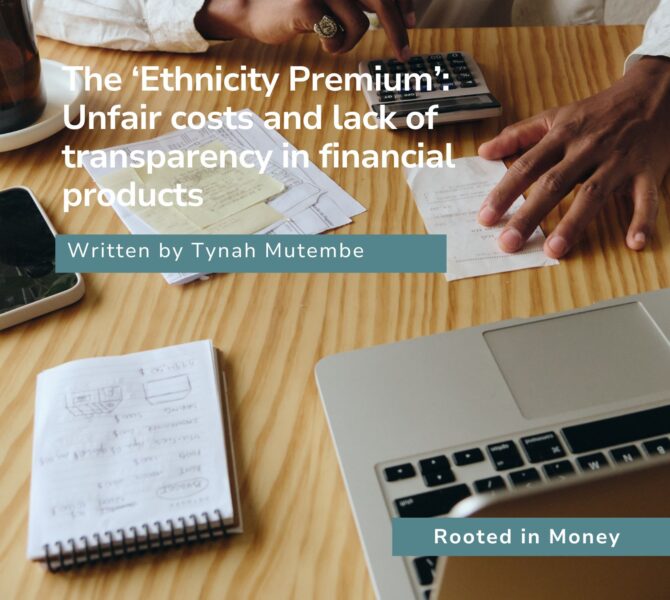For too long, our community has shown remarkable resilience, navigating a system that often forces us to run a race without the financial capacity to influence outcomes. We’ve persevered despite the red tape, bureaucracy, and outright discrimination that have been thrown our way.
Evidenced by “ethnicity premiums,” which are systemic, implicit biases that result in Black communities routinely facing higher costs and less favourable terms for essential financial products. A silent tax to make an already uphill journey to wealth even more difficult.
Black communities pay more for the same products.
It is the story of two identical applicants, with one paying 3.5% interest and the other paying 6.5%. A penalty that starts with the data. When financial institutions rely on opaque, ‘one-size-fits-all’ lending algorithms, they often penalise the very structures of Black economic life. Many new arrivals or those who rely on community credit networks have thin credit files, not because they are bad borrowers, but because the system fails to account for culturally relevant financial data.
Creating a devastating Bad data loop of financial exclusion, resulting in disproportionately higher interest rates on the most fundamental financial cornerstones. When algorithms can’t see our value, they default to pricing in risk, and we pay the difference.
I know this journey intimately. Starting with a thin credit file, a term used to describe a credit report with insufficient credit history to generate a meaningful credit score, I was labelled as risky and unworthy. Being unable to open an account, paying higher insurance premiums, and not qualifying for developmental credit.
I was trapped in a system designed with implicit biases that perpetuate inequality, and this made me financially vulnerable fast.
To truly stand firm in our power and pride, we must advocate for change on two critical fronts:
1. Policy and Transparency (The External Fight):
We must demand mandatory regulatory oversight of the lending algorithms used by financial institutions and credit agencies. Calling for lenders to integrate alternative data sources, such as consistent rental and utility payment records, or regular income from non-traditional sources, to assess creditworthiness fairly. We need greater transparency around how these decisions are made, and we must hold providers accountable for fair lending practices.
Firms must be reminded of their FCA Consumer Duty, a legal requirement to deliver good outcomes for all retail customers. Being charged a systemic ‘ethnicity premium’ is the absolute definition of a poor outcome and a regulatory failure. We need radical transparency around how these decisions are made, and we must hold providers accountable for fair lending practices. It is a matter of policy to ensure that financial technology is used to foster inclusion, not deepen systemic bias.
Kudos to Rooted Finance’s hard work on this front, challenging the status quo and calling for the abolition of the “ethnicity premium” for good.
2. Mindset and Strategy (The Internal Shield):
While we fight the external system, we must simultaneously arm ourselves from within.
This means radically focusing on financial discipline and a strategic mindset that moves us from a posture of fear and survival to one of building. We must replace vague hope with actionable steps. With an attitude to deliberately commit to unlearning scarcity and embracing proactive ownership. Specifically, this means:
- Adopting an “Investor Identity”: Seeing every saving decision not as deprivation, but as funding our future self. We start asking: “What would an investor do with this £10?”
- Focusing on the Controllable: Challenging the noise of the premium by focusing relentlessly on maximising our financial reputation by optimising the factors we can control, managing credit utilisation rates (this is the second most important factor (after payment history) used by UK credit agencies (like Experian, Equifax, and TransUnion) when calculating your credit score.), automating payments, and aggressively clearing high-interest “bad debt.”
- Building Your Financial Boardroom: Recognising that wealth is a team sport. We must seek out and utilise expert advice and support from those who understand our unique position as much as possible, rather than going it alone.
Together, we have the collective ability to overcome these disadvantages. By aligning our personal finances, ensuring our habits are bulletproof, and supporting community-led solutions, we can build a stronger, more financially resilient community that will stand firm in Power and Pride.
The true “giant” we face is often not the interest rate, but the fear and lack of clarity about how to tackle debt, create capital, and build wealth efficiently.
This is the core mission of my book, Conquer Your Financial Giants: Proven steps to master your money and build wealth. Available on Amazon
I wrote this book as a guide and resource I wish I had when I was starting. It’s a complete system designed to help you master your money and build wealth despite the financial headwinds. It provides the strategy to overcome internal roadblocks like the Debt Dragon and the Budgeting Beast, helping you create the robust financial future you deserve.
Let’s stand firm together this Black History Month, inspired by the goal of financial empowerment, demanding fair policy while embracing the financial literacy needed to win the fight.

